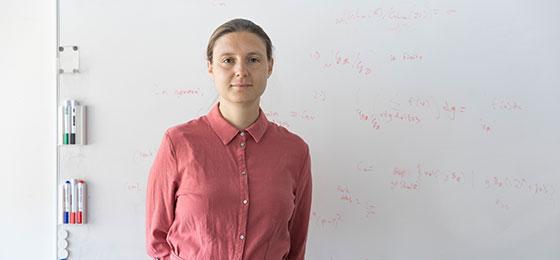The National Latsis Prize goes to Maryna Viazovska

The National Latsis Prize, awarded to young researchers under the age of 40, goes to Maryna Viazovska for her ground-breaking mathematical problem solving.
For the first time, the winners of the two prestigious Swiss science prizes, the Marcel Benoist Swiss Science Prize and the Latsis Prize, are being announced at the same time. In this anniversary year, the Marcel Benoist Swiss Science Prize, often referred to as the Swiss Nobel Prize, goes to Rudolf Aebersold (ETH Zurich/University of Zurich) for his pioneering work in the field of systems biology. The National Latsis Prize, awarded to young researchers under the age of 40, goes to Maryna Viazovska (EPF Lausanne) for her ground-breaking mathematical problem solving. The Swiss science prizes will be presented by Federal Councillor Guy Parmelin at an awards ceremony in Bern on 4 November.
The president of the Marcel Benoist Foundation, Federal Councillor Guy Parmelin, said: “We are delighted by the cooperation with the Fondation Latsis and the first joint awarding of the two prizes. In doing so, we are enhancing Switzerland’s standing as a location for scientific research.” The scientific selection process was conducted by the Swiss National Science Foundation on behalf of both foundations.
Solver of a centuries-old mathematical problem
The 2020 National Latsis Prize with an award sum of CHF 100,000 goes to Maryna Viazovska. The young EPFL mathematics professor from Ukraine achieved a scientific breakthrough in solving the sphere-packing problem in 2016. “I am delighted that the Latsis Prize will boost the outstanding reputation of my Institute and all its staff. Naturally, I also hope that the prize will help to inspire young girls to go into mathematics”, said Viazovska.
The mathematical derivation of the densest possible arrangement of spheres in a given space goes back to a problem posed by the explorer Sir Walter Raleigh in the 16th century. He raised the question of how cannonballs should be stacked in the densest possible way on a ship. For centuries, luminaries of mathematics made assumptions about the sphere-packing problem in multidimensional space, which could only be proven three-dimensionally in 1998 through huge computer calculations.
Viazovska caused a sensation in the world of modern mathematics with her original and amazingly simple calculation of the densest sphere packing in the much more complex 8th and 24th dimensions - the latter in cooperation with a research group. Research results on sphere packing in high-dimensional spaces also have practical applications in everyday technology. For example, in the analysis of crystal structures or in troubleshooting signal transmission of mobile phones, space probes or internet connections. While work on these two dimensions had previously been based on hypotheses, Maryna Viazovska’s exploit delivered the mathematical proof and is already being used in efforts to solve fundamental problems in applied mathematics.
The Swiss science prizes will be presented by the Marcel Benoist Foundation and the Fondation Latsis at an awards ceremony to be held in Bern Town Hall on 4 November.
Laureate 2020: Maryna Viazovska
Maryna Viazovska was born in Ukraine in 1984. In 2002 she won the International Mathematics Competition at the age of 17; three years later she triumphed again. She completed her BSc in Mathematics as the holder of the Ostrogradsky Research Fellowship from Kyiv National Taras Shevchenko University. After obtaining her Master’s degree from the University of Kaiserslautern, she moved to the Max Planck Institute at the University of Bonn in 2007 to take her PhD, and to Humboldt University in Berlin to pursue her career as a post-doctoral researcher in 2014. She has been a professor at the EPF Lausanne since 2017 and is Chair of Number Theory. Viazovska holds numerous academic awards, including the Clay Research Award (2017), and the New Horizons in Mathematics Prize (2018), which was founded by Mark Zuckerberg and Juri Milner.
This is a press release from Foundations Marcel Benoist and Latsis Internationale.
Contacts
For information regarding the selection process: